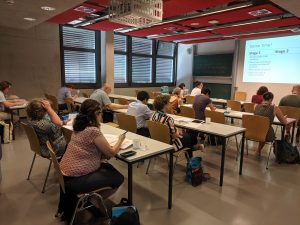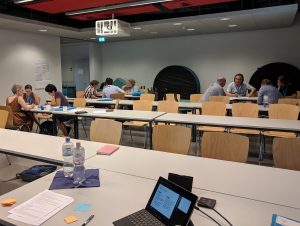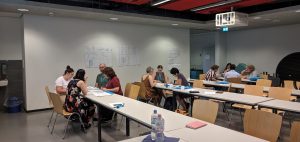Just in case this obvious thing needs to be said: I know I’m going to make mistakes in this work. But I can’t let my ego get in the way of trying to work against racism. So let’s talk.
After Tweeting and Facebooking off and on this topic for weeks, I’ve realized it’s time to start *actually* writing about it. This first post isn’t meant to be exhaustive or complete or perfect, but to help me organize my thoughts a little bit more deeply. And I post this publicly because maybe it’ll be of use to others, too.
I’m really thinking a lot about how decisions get made in my higher ed context (UBC) and in my discipline (psychology). In the 17 years I’ve been working and learning at UBC, I’ve seen countless decisions depend on opaque, hidden, unpublished, squeaky-wheel-gets-the-grease, kinds of processes that have bothered me since the very beginning. I’ve always known they are unfair, but couldn’t really pin it down, or feel any ability to change things. These processes privilege those who already feel privileged in this institution, and they form barriers for people to enter/succeed who don’t know how the system works or don’t have the right connections. And now I see these decision-making processes as fundamental to the maintenance of systemic racism… at an institution physically situated for the last 100+ years on the unceded traditional territory of the Musqueam Peoples.
I am grateful to everyone who has contributed to recent calls to action in society broadly (#BlackLivesMatter, #IndigenousLivesMatter), in higher education specifically (e.g., #BlackInTheIvory). Although sorry I didn’t see this connection sooner, these calls to action have helped me draw the link between systemic racism and decision making processes in higher education.
Also so grateful to the people with whom I have been able to dialogue in (socially-distanced) person and online (especially Dr. Amori Mikami and Isobel Allen-Floyd), as I continue the journey into anti-racism work.
It’s important to acknowledge that I have learned to play these games, to find out how decisions really get made here and to insert myself in those spaces. I have benefited from this system. It did not come naturally to me at all. I had to learn this game because I am first generation in the academy. But I’d be naive at this point to think that being White didn’t help me out here. I could go under the radar, get free passes, was assumed to be “one of us” who comes from a long line of scholars. Also relevant for the timing of this work: I received my promotion to Professor of Teaching last year, which has been liberating.
A few resources…
Here are a few snippets from my more recent readings that have really stood out to me:
From Chun & Feagin (2020, Ch 4 “Reformulating the concept of “microagressions”: everyday discrimination in academia”): “A forward-looking and flexible analysis shaped by changing new social and demographic realities should address the impact of covert racial and gender discrimination whose intentionality is hidden within highly nuanced institutional processes and cleverly disguised in vague “meritocratic” justifications” (p. 129, emphasis added). This chapter also led me think on why the concept of “micro-aggressions” is so problematic, including Scott Lilienfeld’s paper “Microaggressions: Strong claims, inadequate evidence” (2017, in Perspectives on Psychological Science; as well as his essay version).
In an interesting twist, our own UBC President Dr. Santa Ono tweeted about Chun & Feagin’s book last year:
Shoutout to my colleagues Edna Chun and Joe Feagin on their outstanding new book on diversity in higher education. pic.twitter.com/GciRv4tCd4
— Benoit-Antoine Bacon (@ubcprez) September 4, 2019
The role of “Department Chairs as transformational diversity leaders” by Alvin Evans & Edna Chun (2015, in The Department Chair), https://onlinelibrary-wiley-com.ezproxy.library.ubc.ca/doi/pdfdirect/10.1002/dch.30001
In psychology: (almost) exclusively white journal editors and editorial board members on prestigious journals is linked to fewer authors who are POC and to fewer participants who are POC and to less published research in those journals that examines race. This link marginalizes a crucial variable (i.e., our science is worse for it, conceptually speaking) while simultaneously hurting the careers of people who examine the impact of race (who are more likely to be POC). See Roberts et al (2020 in Perspectives on Psychological Science) https://doi.org/10.1177/1745691620927709. See also
And some key sources that I have found inspiring/helpful over the last couple of months:
- https://www.academics4blacklives.com/
- 10 Signs Of Institutionalized Racism And The Rhetoric Of ‘Greatness’
- White Academia: Do Better
- #GoodAncestor Robin DiAngelo on White Fragility
- Racism Exists in Canada
- Accept that you’re racist, then get to work dismantling racism
- See also my thread of resources from June 2, and this one from June 10
Action
The upheaval resulting from COVID19 is creating an opening for meaningful change in so many ways. People are throwing their hands up and acknowledging we have to re-make pretty much every decision about how we do things anyway… so why not use this moment to build better? Do I “have time” for this? [insert obvious answer] But how can I not? When will we ever get another chance like this?
So, I have begun this work over the past couple of weeks by examining and questioning decision-making processes, particularly as I see them play out in my Department. This is not because I think my Department is any better or worse than any other unit — I’m operating under the assumption that systemic racism is everywhere. Instead, it is where I think I might have the most potential to have some impact in the short-ish term. I can use the bits of power and privilege that I have accumulated through decades of game playing to speak loudly and advocate for change.
Drawing most directly from Chun & Feagin’s work, but informed by many, I am identifying processes that (1) lack clear criteria that are made explicit to those who will be judged by them, and (2) nonmeritocratic job access (i.e., facilitated by or depending on who you know), especially when clouded by rhetoric that decisions are made based on merit.
I’m looking these decision making process as they operate among faculty members (e.g., teaching assignments), and among students (e.g., mechanisms for entry into research assistant positions in labs, including the fact that the first ones are almost always volunteer). Changes made in these areas might actually increase some efficiencies while making them more accessible more broadly.
What am I missing? Where would you start? Are you with me? (Please!?)
And just in case it needs to be said (again): I know I’m going to make mistakes here. Maybe you’re reading this and thinking I’ve already made a bunch. I can’t let my ego get in the way of trying to work against racism. So let’s talk.

 Follow
Follow


